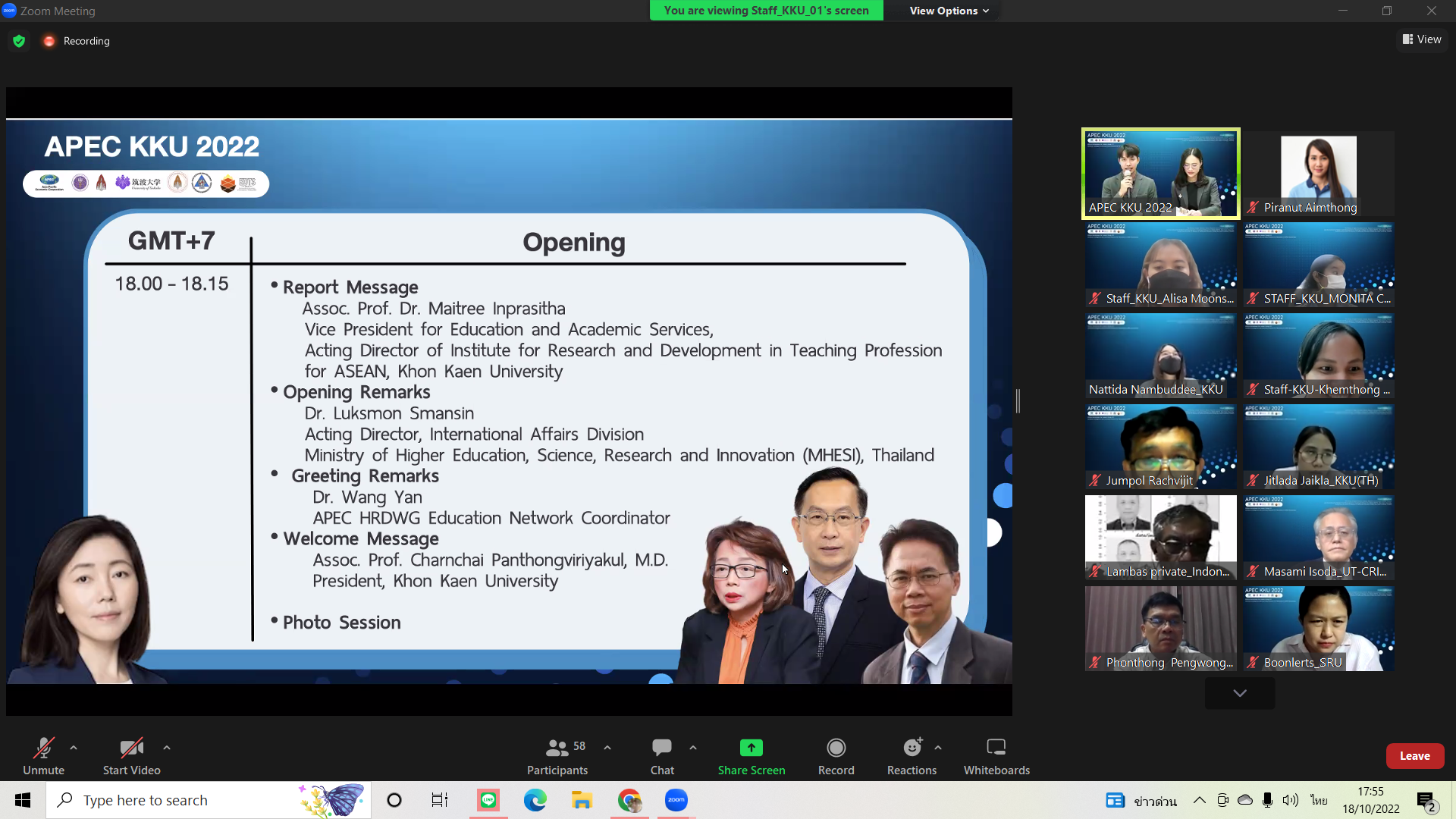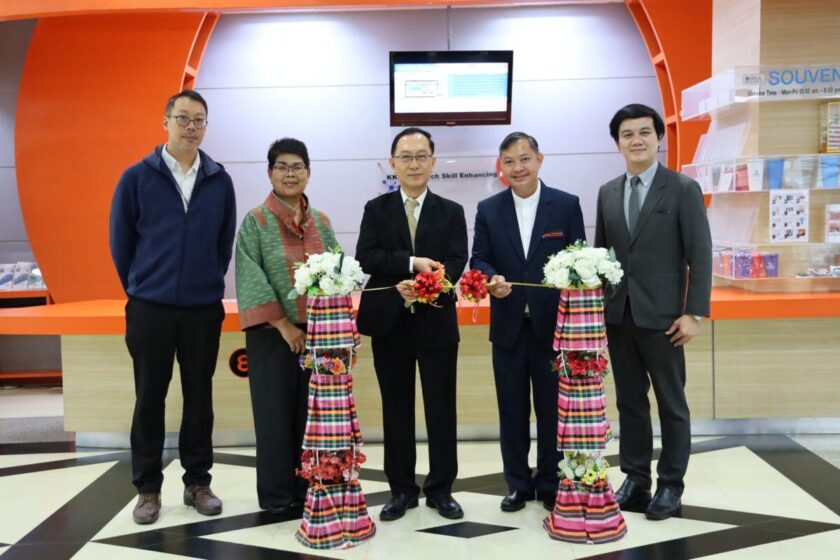KKU, with the support from Office of Permanent Secretary, MHESI, organized the APEC-KKU 2022, “Online Workshops for Lesson Study 2.0: Artificial Intelligence (AI) and Data Science for Education in APEC Economies, as the stage for experts, researchers and academics in the APEC Economies to exchange ideas related to success of the use of the Lesson Study.

October 18, 2022, from 18:00 to 21:00 hours (Thailand time) – Khon Kaen University by the Education and Academic Service Section; the International Affairs Section; the Institute for Research and Development of Teaching Profession for ASEAN; Mathematics Study Research Center; and Tsukuba University, Japan, with support from the Office of Permanent Secretary of the Ministry of Higher Education, Science, Research, and Innovation; organized the APEC-KKU 2022, “Online Workshops for Lesson Study 2.0: Artificial Intelligence (AI) and Data Science for Education in APEC Economies online.

Assoc. Prof. Charnchai Panthongviriyakul, M.D., President of Khon Kaen University delivered the welcoming speech to participants of the APEC-KKU 2022.

Dr. Wang Yan, APEC HRDWG Education Network Coordinator delivered the welcoming speech to the participants of the APEC-KKU 2022.
Assoc. Prof. Charnchai Panthongviriyakul, M.D., President of Khon Kaen University and Dr. Wang Yan, APEC HRDWG Education Network Coordinator delivered the welcoming speech to the participants of the APEC-KKU 2022. Dr. Luksmon Smansin, Acting Director of the Division of International Relation of the Ministry of Higher Education, Science, Research, and Innovation presented an opening speech while Assoc. Prof. Maitree Inprasitha, Ph.D., Vice President for Education and Academic Service delivered the reporting speech.

Dr. Luksmon Smansin, Acting Director of the Division of International Relation of the Ministry of Higher Education, Science, Research, and Innovation presented an opening speech

Assoc. Prof. Maitree Inprasitha, Ph.D., Vice President for Education and Academic Service delivered the reporting speech.
The event in Thailand this year was organized under the spread of Covid-19 and emphasized the seminar as the stage for experts, researchers and academics from the APEC Economies to exchange ideas and attitudes related to the success of the use of the Lesson Study, and to discuss the possible improvement of AI and Data Science. Participants were able to learn and share their experiences in the session of special talks by experts from all over the world related to the development of instructional innovation and the use of the Lesson Study under the change of AI and Data Science.
Following are the special talks by the keynote speakers who are representatives of different economies:
– “Project Linkages” by Prof. Dr. Masami ISODA, Director of CRICED, University of Tsukuba, Japan, on the network collaboration and success of the APEC Lesson Study Project from 2006 to 2018. The Lesson Study 2.0 principally involves:
1) Developing innovative methods of analysis as for sciences of lesson study by using AI and Data Science approaches: what approaches and why?
2) Developing innovative teaching approaches by using newest educational environment/system/software which embedded AI: what environments?
3) Developing innovative environments for extending and adapting the current product, theme or objective of lesson study: How can we embed?
The following 3 keynote speakers then talked about the development of the three developments:– “Blended Learning Classroom (BLC) Model: Integrating Lesson Study and Open Approach Innovations for the New Normal” by Assoc. Prof. Dr. Maitree Inprasitha, Khon Kaen University, Thailand. The talk was on instruction based on the Blended Learning Classroom Model, integrated with the Lesson Study and the Open Approach under the New Normal. This has been carried out in many schools in Thailand. The key to integration is allowing students to solve problems and learn by themselves.”
– “Lesson Study on the experience of SEAMEO” by Ms. Teh Kim Hong, The Association for Science and Mathematics Education Penang (ASMEP), Malaysia. This talk was on the long-term developmental collaboration by the network and the experiences of the application of the Lesson Study in Malaysia from 2002, which was conducted by building conscience among the experts who improved the content in science and mathematics training.”
“Lesson Study through the Internet” by Wahyudi, SEAMOLEC, Indonesia. This talk was about the research and the Lesson Study that had been normally ongoing before the Covid pandemic. When Covid spread, the online course was used to train on planning and reflecting the results together through various programs such as Microsoft Team Google Meet, facilitating recording and extension of use.”
The seminar experts from different economies also talked about the past Lesson Study Project in the APEC economies and discussed possible improvement under the direction of the present world, i.e., AI and Data Science.
– “How to boost students written mathematical argumentation?” by Prof. Roberto Araya, Universidad de Chile. The speaker shared ideas for research on written argumentation with 16,618 open ended questions by fourth graders from 464 schools.
– “The challenge of Developing students’ statistical reasoning in times of data science: Chilean experiences in Early Statistics” by Prof. Raimundo Olfos, Prof. Soledad Estrella, Universidad Católica de Valparaíso, Chile, who talked about instruction of data science in Chile, with examples of the practical works where students developed statistical reasoning.
– “Russian Federal Educational Standard 2021: the Exemplary Curriculum in Mathematics of 7th and 9th graders’ Probability and Statistics” by Prof. Ivan Vysotsky, Moscow Center for Continuous Math Education Probability Theory Laboratory, Russian, who shared about the development of mathematics program development on possibility and statistics at Grades 7-9 level.
“Artificial Intelligence (AI) and Data Science in Education” by Toh Tin Lam, National Institute of Education, Nanyang Technological University, Singapore, who presented about Computational Thinking in the mathematics study pedagogical system in Singapore.
“AI for Education: Korean report for Lesson Study 2.0” by Hee-chan Lew, Korea National University of Education, South Korea, which was on the Lesson Study for AI, including mathematics texts for high school level related to AI basics and AI Mathematics that are used in 2022 and already in use in some schools for students who want to select the subject.
“Artificial Intelligence (AI) and Data Science in Education in Vietnam” by Prof. Nguyen Chi Thanh, Vietnam National University, Vietnam, which reflected the present situation related to Artificial Intelligence (AI) and Data Science in Vietnam and which suggested the future collaboration with countries under APEC Economies.
The APEC-KKU 2022 this year was open for the public to register for attending the activities. There were over 200 online participants from 16 economies and 4 non-APEC member economies.
News Information: Peeranuch Iamthong, Institute for Research and Development of Teaching Profession for ASEAN, KKU






















































